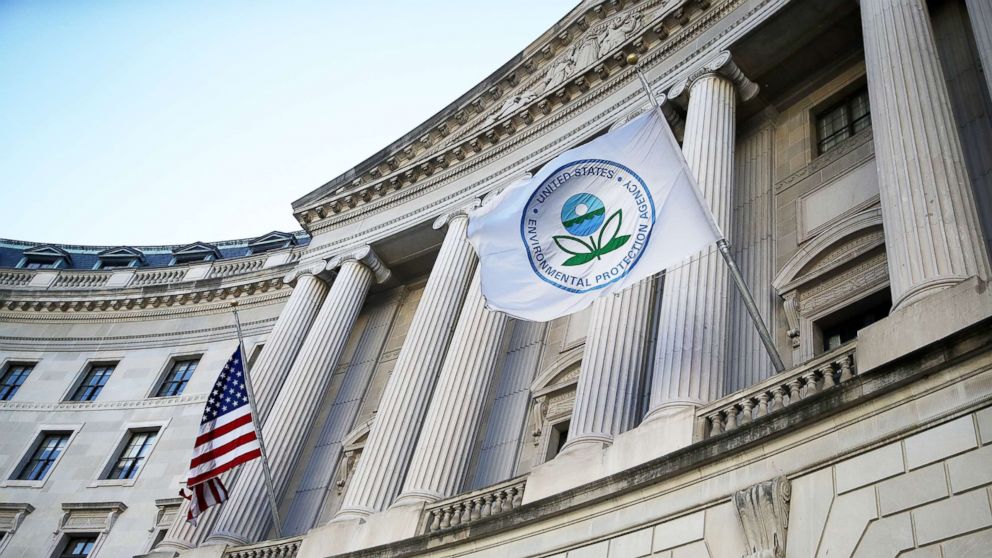Environmental, health advocates speak out against EPA 'secret science' rule
The EPA held a public hearing on a rule to limit what research it can use.

Environment and health advocates are calling on the Environmental Protection Agency to abandon a proposed rule that they say would hurt environmental protections by blocking the agency from using some scientific research in its regulations.
The EPA held a public hearing on its "Strengthening Transparency in Regulatory Science" rule Tuesday, which former EPA Administrator Scott Pruitt said would bar the agency from basing regulations on science where the raw data is not made public -- what Pruit called "secret science." More than 200,000 public comments have been submitted on the proposal since it was announced in April.
Dozens of representatives from groups including the American Lung Association, Moms Clean Air Force, and Union of Concerned Scientists testified against the proposal in the hearing.
When he announced the rule, Pruitt said it would make regulations at the agency more transparent because any study used to write a rule could be replicated. But critics say because many EPA rules are related to protecting health, some of the data that is used in that research can't be released without breaching the privacy of the people involved.
Advocates from health and environmental groups say the rule is vague and would block regulators from citing research into the health effects of pollution, which usually does not release raw data due to privacy concerns.
Michael Halpern, director of the Center for Science and Democracy and the Union for Concerned Scientists, testified that the rule would prevent EPA from carrying out its mission to protect human health and the environment.
"Without the ability to use this scientific information, EPA would be unable to meet its mission and statutory obligations. This proposal would make it significantly harder for EPA to use the best available science to protect the public, including from harmful emissions of hazardous air pollutants, particulate matter and ozone, exposure to dangerous chemicals in commerce, (and) drinking water contaminated with toxic chemicals such as PFAS or lead," Halpern said.
In one example, the director of the nuclear program for the Natural Resources Defense Council said the proposed rule could undercut standards for radiation exposure because the EPA would no longer be able to rely on research on atomic bomb survivors -- because the data is available to other researchers but not the general public.
Matthew McKinzie, director of the nuclear program for the Natural Resources Defense Council, said the rule would exclude important studies about atomic bomb survivors, for example, even though the studies are well-regarded and have been reviewed by other researchers multiple times.
"Implementation of the rule would effectively block the use of such key scientific studies and allow for radiation standards to be either wholly weakened or made functionally meaningless," McKinzie said in his testimony.
The studies McKinzie cites and other health-related studies about issues like smog pollution or chemical exposure often study thousands of individuals monitored for decades, and researchers say they can't publicly release the data because it would not be possible to remove all the personal information or that the research subjects did not consent to make the data public.
Some advocates say the rule isn't actually about transparency but would benefit industry groups who want fewer regulations.
Groups like the Competitive Enterprise Institute, American Petroleum Institute, and the American Chemistry Council say they support the rule and would work with other stakeholders to maximize transparency while working within limitations like information that legally can't be made public because it includes private health information.
A report released by the conservative Competitive Enterprise Institute on Tuesday says the rule is actually more limited than critics say and that the EPA would still be allowed to use research that can't be made publicly available when it is "not feasible" to do so. Angela Logomasini, a senior fellow at the institute who attended Tuesday's hearing, said some of the testimony ignored that other laws like the Safe Drinking Water Act require the EPA to use the "best available science" so it could not ignore studies who use data protected by privacy laws.
"Numerous presenters raised concerns that the transparency rule would somehow prevent EPA from using the best available science, and thereby prevent EPA from making rules to protect public health. Nothing could be further from the truth," said Angela Logomasini, a senior fellow at the institute who attended Tuesday's hearing. "The rule explicitly provides exemptions for science that cannot be released because of privacy concerns," Logomasini said, adding "Perhaps some opponents are actually more concerned that data release will undermine their ideological views about regulation."
But critics, including Democratic lawmakers, said the rule was unnecessary and implied that EPA was previously using science that wasn't already vetted by other researchers.
"The proposed rule perpetuates the incorrect notion that the science the EPA relies on is somehow hidden. It is not,” Rep. Suzanne Bonamici, D-Or., said in her testimony. “The EPA would be forced to ignore valuable information discovered during their research because it contains confidential information. This would have chilling consequences for the EPA and every person who benefits from clean air and clean water."
The proposed rule is open for public comment until August 16. An EPA official said in a statement that the agency will consider all submitted comments when updating the rule.




